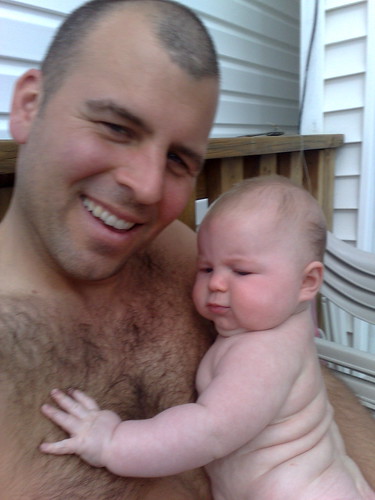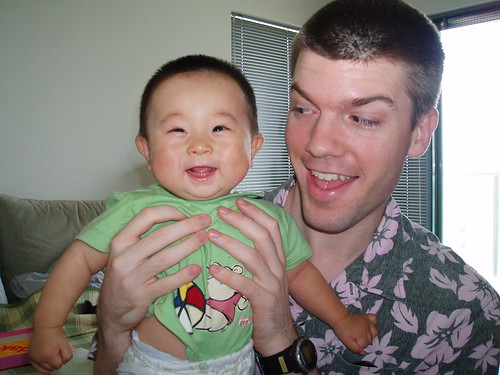You’ve probably seen this everywhere already, but as part of our ongoing effort to figure out why we do this, there’s an aid blog survey out there to find out why readers read. Roll on by and offer your opinion.
Author: Alanna Shaikh
And so it goes

Yesterday, my office had a retreat. We’re in the middle of a messy, stressful workplanning process, so we took a day to relax in the sun (and finalize some of our logframes). During lunch, after the swimming, my colleague A turned to me. I don’t know if it was the vodka or the Tajik sunshine, but he said to me, “I started doing surgery as a medical student. It was the war, and they needed every hand.”
I was pretty sun-dazed myself, and I answered, “Did you save people?”
“Some people,” he said. “Not all of them. I remember every one I lost.”
After that we took the baby swimming for the first time, and then he lay on a towel in the shade, naked and kicking his feet. About 80% of my colleagues are doctors, and an undressed human being was irresistible to them. They’d walk by, stop, and do a brief physical. I now know his eyes are good, he is properly symmetrical, and he’s big for his age. (Actually, I knew all that already, but verification is always nice.) I was quizzed about my breastfeeding practices, my plans for introducing supplementary foods, and where he sleeps.
That led naturally into long conversations about Tajik children. They tend to fall off their growth curve when supplementary food is introduced; parents give them too much bread and not enough food with caloric value. We brainstormed ways to educate mothers, and grandmothers, about feeding young children. We want every baby to be as chunky and happy as my little guy is.
It was a really good day, the kind of day that reminds you why you choose to do this.
Driving home to Dushanbe, I was suntanned and contented and full of plov. When my husband called, I answered the phone happily. He told me that the Ministry of Foreign Affairs won’t renew the baby’s visa on a technicality. The visa expires Saturday. We need to leave the country by then and reapply for the visa from outside the country.
So now we’re scrambling to find a place two American citizens can get to easily from Dushanbe, without a visa, since the baby doesn’t have any visas yet besides the Tajik. (Odds currently favor Frankfurt, though I am pulling for Dubai since I haven’t been there since I was a kid.) It’s going to be expensive, and disrupt my work, and I’ll miss seeing my older son, who comes back from Iowa on Monday. Plus I don’t know how we’ll resolve the visa technicality even from outside the country.
Up, down. That’s the life. It’s worth it, but this sucks.
******
Chosen because when I did a Flickr search for “naked baby” and it gave me a picture of someone I know, it seemed like a sign.
Six things I was thinking about while on maternity leave:
1. Does the success of cash transfers mean that poverty is a result of the capitalist system and instead of working for international development projects I should be an activist trying to change the global economy?
2. Are we going to look back at 2011 as the year that climate change became obvious in US weather?
3. Why is it so hard for people to understand breastfeeding? (I just had a woman at a convenience store tell me that she didn’t breastfeed because her milk didn’t come in because she didn’t drink much milk when she was pregnant. I was genuinely at a loss for words.)
4. Behavior change efforts work best when we remove obstacles and help people do what they already want to do. Is it possible to frame all change programs that way? Or are we stuck always trying to change what people want to do?
5. I agree with GiveWell’s conclusion that philanthropic money is better spent overseas than in the US (thus my career choice) but wow, the US is awfully bad off in some places.
6. Premature babies are often born early because of difficult circumstances in the life of the mother: chaotic or abusive home life, poor nutrition, poor access to medical care. Then we sent these fragile babies home to the same situation that made them this way. It’s a vicious cycle.
Stop Trying to Hold My Baby

So, on Monday I had a baby. (He’s healthy, I’m healthy, and he’s the most perfect and adorable baby in the whole world, for the record. And no, that’s not him in the picture; the internet and kids makes me nervous.) We’re home from the hospital now, and returning to ordinary life, which is as you’d guess a lot of work. And lots of well meaning people want to help me. So they offer to hold the sleeping baby so I can get something done.
But holding the sleepy baby is not helpful. Holding a baby while they sleep is the single best part of having a newborn. They’re all sweet and snuggly in your arms, and they look like angels. Holding the unconscious baby = not work.
If you want to help me, offer to make me a sandwich or clean my bathroom or scan my tax documents so I can pay the IRS. Or hold the baby when he’s crying and won’t nurse or sleep or settle down. That’s the help I actually need right now.
I think too many aid projects just want to hold the baby. (In the case of orphanage tourism, quite literally.) They see what they think is a need – a need that’s easy to fill! And they rush to do it. They don’t stop to ask – what do you need?
This is true both of big institutional donor programs that are eager to apply the sexy solution of the day to every situation – microfinance, health savings accounts, results based financing – and small individual donors who create tiny barely-functional NGOs to provide broiler chickens or used clothes to the needy.
The answer is to pause first, and actually find out what people need. It sounds easy, but it’s not. Just asking people generally isn’t enough. I feel like a total jerk complaining about the nice people who want to help me by holding my son, and I am a deeply privileged resident of the wealthy world.
If I was a Bangalore slum-dweller or a Congolese villager, who would I feel comfortable talking to about my needs? Would I talk to a researcher from the capital about what I need and what I don’t? Or would I just be afraid that if I criticized any aid, they’d send it all somewhere else to people who were grateful?
Bad aid isn’t solely the result of laziness or indifference – doing research on people’s true needs is surprisingly difficult. So is designing programs that meet those needs. But taking the time to do it makes all the difference.
++++++++++
Chosen because it’s a guy holding a baby
The long-awaited review of Fighting for Darfur, by Rebecca Hamilton
This is an important, useful, well-written book. And it’s not all that long, so there is really no excuse not to read it. The book looks at the Darfur advocacy movement, and seeks to answer two major questions: 1) Did the movement have an impact on US policy in Darfur and 2) How much impact could the US actually have on the situation in Darfur?
To answer these questions, Hamilton has done an exhausting amount on research. She has talked to just about every major player on Darfur, from US State Department and USAID officials to Darfuri refugees, Sudanese government officials, and the leaders in the Darfur activism groups. The result is a dispassionate, even-handed analysis of what went wrong in advocacy for Darfur.
It turns out I am terrible at writing book reviews (sorry everyone who’s been sending me review copies!) so I’ll move on to some bullet points that I took down as I read the book:
- This is a book about advocacy on Darfur, not a book about Darfur. If you don’t already have a basic background on the genocide and what came after, then you’ll have a hard time getting everything out of this book. Hamilton recommends A Short History of a Long War for background on Darfur.
- In many ways, this is a book about the waning of American power. However much the activists could influence US decision-making, the US alone could not help Darfur.
- Activists for Darfur were suffering from two major flaws in their perception. First of all, they lacked context on Sudan beyond Darfur, and on the history of Darfur and the nation as a whole. That led to a focus on certain policies and interventions that were not necessarily what was best. Next, they overestimated American power projection. By the time they understood that US power alone could not “save” Darfur, they had missed a number of valuable opportunities to work internationally.
- I was proud of USAID throughout the book. USAID officials were some of the first to speak up about the genocide, and they seemed to consistently fight for the safety and welfare of Darfuris and Sudan as a whole in a way other US government officials did not.
My overall conclusion: buy this book. It’s useful for anyone who wants to know more about Darfur activism, or learn about international activism in general. I am very glad I read it.
Here’s the Amazon (affiliate) link if you want to buy:
An Interview with Rebecca Hamilton, Author of Fighting for Darfur
I was recently lucky enough to receive a review copy of Fighting for Darfur, Rebecca Hamilton’s new book on the Darfur advocacy movement. In the book, she attempts to answer the big questions: what was the impact of the Darfur advocacy movement on US policy? And how much could the US actually influence the situation, anyway?
I’ll put up my review on Tuesday, but I’ll get us started now, with a brief interview I did with Rebecca last week:
AS: What made you decide to write this book?
RH: Genuine curiosity on my part. I was at Harvard being supervised by Samantha Power, talking to the people who believed that creating an outcry would make a difference. As it became clear it wasn’t working, I wanted to know why.
AS: Did writing the book upset anyone?
RH: It was a genuine research question, and the people I was speaking to had similar questions themselves. They also wanted to know if this isn’t working, then what are we doing wrong? It was probably helpful that I came from that movement, and that I really made an effort to talk to people in the advocacy movement. I didn’t come at this with a certain belief. My position was that for the most part, most advocates were driven by good impulses, but that doesn’t mean you can’t be critical of what they ended up doing.
I wasn’t coming into this with an agenda, and people trusted that.
AS: Fighting for Darfur is a book about the Darfur advocacy movement, not necessarily Darfur itself. If people want to read a companion book about just the situation in Darfur, what would you suggest?
RH: A Short History of a Long War, by Alex de Waal.
AS: In the book, you talk about lessons we can learn about advocating on genocide. Are there lessons that international advocacy in general can take from this?
RH: Be clear about what your theory of change is. I think the advocacy community – and I was part of this as a student activist – took too much for granted about what the right theory of change was. It was derived from Rwanda and didn’t update for new context. Not only because Darfur was not Rwanda but because the world had changed and the US position in the world has changed, and pushing Washington was one very small part of the story.
Recognize we are not in a position where the US has ultimate hard and soft power in every situation of mass atrocity. It’s also about how to move other actors in the global geopolitical realm.
None of these things are facts. Part of the problem with Darfur is that we took the lessons of Rwanda and just superimposed them. I hope the message people take away is not just to cut and paste directly onto the next situation. In another decade the may be situations where the US is the best actor.
We have to be very careful about how we apply lessons learned.
AS: Were there subjects you’d like to have covered in more detail in the book but didn’t get the chance?
RH: The draft I submitted was nearly twice the size of what I submitted. I felt hugely constrained by word limits. There was so much. I was already pulling together 2 strands of the story – the advocacy community and the diplomatic realm, so the third strand of Darfur I had to remove. I had to take out broader questions on peacekeeping and what we can expect of peacekeepers.
The other was spending more time on this shifting geopolitical moment, where US influence is not at its height but it’s not clear what role China and BRIC will play in preventing mass atrocities. It would have been nice to keep in those broader questions.
AS: Do you have another book project planned? What are you doing right now?
I have ideas on new projects, but for the moment I feel like I haven’t finished this one. I still have a lot of work to do just getting the messages from Fighting for Darfur out into the public realm, and I want to focus on that.
The Challenge of Being a Donor

I recently got an email from a reader frustrasted by how little he has learned after 30 years of being a donor to international developement causes. With his permission, I am posting our email exchange here:
The letter
I have been giving to aid organizations such as Oxfam America and Trickle Up for over 30 years. Yet my thinking has not benefited from 30 years of direct feedback. I have no independent means of hearing from the people served by these organizations.
Recently, it occurred to me that I should focus on a single region in a particular country where there is a program in place. I would see if I could develop direct relationships with people in that region. Then I would be exposed to different perspectives.
Is it plausible to think that using modern forms of communication, I might be able to form lasting long-term relationships that would give me a useful, local perspective on various aid efforts?
I am also wondering if a problem such as malaria might offer a way to partner with others who are working in the target region.
Are these sorts of relationships for two-way learning and long-term problem solving possible? Can individuals learn from each other and not have the learning mediated by the media or aid organizations?
My Answer
You’re up against one of the most frustrating situation for a committed donor: it feels like throwing your money down a well sometimes. You can’t tell if things are changing because they change so slowly, and when they do change you can’t tell how much of it was because of you. I think that feeling is a big part of what drives the current trend toward randomized controlled trials on international development interventions.
In terms of connecting with people who actually interact with aid programs, I think the answer is a qualified yes. Most of the developing world is rapidly coming online and using social media in particular. People are using the internet even when they don’t have water or consistent electricity.
However, the question that comes to mind for me is: what’s in it for them? What is the motivation for a 22-year-old Malawian to communicate with you about aid programs and their impact on her life? You would benefit from getting a local perspective on where your money goes, but how does your dialogue partner benefit? Their time is valuable and internet access is not free – why should they spend that on you?
If you can find a way past that hurdle, then I think yes, interpersonal learning is completely possible.
One final thought for you – are you familiar with the work of GiveWell.org? I don’t agree with all their conclusions, but they do an excellent job of identifying organizations that perform, and share, genuine impact evaluations. You might consider shifting your giving to such an organization.

